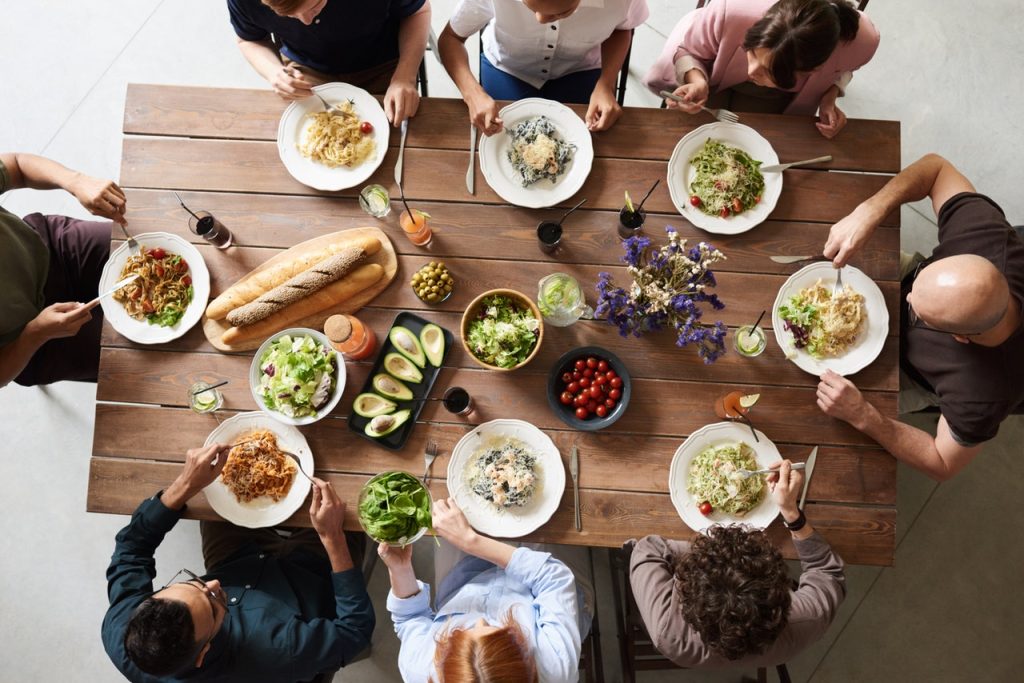Article by Dr. Sarah Lantz
At a recent book launch, a colleague confided in me, “Honestly”, she said, “who has time to cook anymore? I reckon my children are probably going to grow up wondering what a kitchen is.”
Her statement had that usual blend of wit and exhaustion that I am used to hearing, yet as we get closer towards the flu and allergy seasons, and questions of how to boost immunity become pressing, I believe body resiliency is all about returning to the kitchen. Not in a chained-to-the-kitchen-sink kind of way, but I would go so far as to say that our nation can only be as physically and emotionally healthy as the vibrancy of its household kitchens.
A bold statement, I know, but the statistics are clear “ no healthcare system can work if a culture exits the kitchen and subcontracts their eating to a conventional, industrial food system. Nobody is as interested in your health “ and that of your children and family “ than you are (or could be). Whatever you eat and drink ultimately becomes your flesh, your bones and blood, your skin, your cells “ your immunity. Home-cooked, real ingredient meals, critically help safeguard our bodies “ controlling not only what goes in, but what stays out “ and maintains our overall health and wellbeing. Is there anything more important than what we put in our bodies every day? Is there? Yet, these days, it doesn’t seem that simple.
As a society we are cooking less than ever before, which is ironic given that as a nation we also have a preoccupation with television cooking shows. We are living in a time where chefs are household names, many elevated to celebrity and sporting hero status, yet the irony here is that as a society, we are still fatter and sicker than ever before, and less capable of preparing food for ourselves.
Whilst it is self-evident to point out that we can’t nourish ourselves with the food we watch on television, and while there is an argument that these shows are assisting people to talk more about cooking and food, it seems we are doing just that “ just talking.
“The decline in home cooking,” writes author Michael Pollan, “closely tracks the rise in obesity and all the chronic diseases linked to diet.”
We all have to make the decision to cook (or not).
“Sorry, but I have work” is probably the most common catch cry from parents for not cooking, nor leading the kind of healthy lifestyle they wish they could. I get it. Long hours remain a stubborn feature of Australian working life. Couples in dual-earner households work an average combined total of 81 hours for those without children, and around 75 hours for those with children under 16 years of age. For women who continue to carry the lion’s share of domestic and child-rearing responsibilities on top of work, the juggle is especially apparent. We are a society of fast-paced people “ all perhaps moving too fast for cooking.
For these reasons I have no argument against convenience as a means to support working parents and busy households “ in principle. I know all too well that the ‘work-life balance’ is as elusive as a mythical creature and has a lot to do with a round-the-clock corporate culture and the lack of flexible but secure work options. In fact, because of this work-life culture I’m totally enamoured by my dishwasher, and I take significant pleasure in my blender and the shiny tools that line my kitchen drawers that generally make my life easier and meals quicker. I also know all too well the importance of a quick meal after a long day of juggling work, school pick up, choir classes, and school home work. Tubs of miso for making soup bases and packets of pasta are just fine by me most of the time. I’m also not above driving to my local Vietnamese shop and having them make me some rice paper rolls after a long day. This is called self-preservation, and I cut myself some slack. But, I think if I were to be seduced by speed and convenience all the time I know something in my home life would simply… snap.
Research continues to reveal that home meal time is more than just consuming fast food. A shared meal is no small thing. It’s the one place where a family can consistently come together. It’s a place for connection. A place where our children (and parents) learn to sit and engage in the art of conversation, share experiences, take turns, and enjoy the delights of homecooked food, not to mention the vast immune boosting benefits of a home cooked meal.
From my own experience, cooking does not have to be a time-consuming activity “ unless you want to prepare something extravagant. What can be easier than popping a roast, some root vegetables, stock and herbs in a slow cooker before you go to work and setting the table at the end of the day? Just allow it to slowly simmer all day using low watts of electricity. No cans or plastic wrappers or boxes to dispose of, no special serving dish required, and no artificial anything. And home cooking “ like any skill “ gets easier and better with time.
What starts off as daunting at the beginning eventually becomes routine with time and persistence. The trick is just taking the first step, diving in and making mistakes. Who cares if the bread doesn’t rise and the scrambled eggs sticks to the pan? Kids don’t. Who cares if pork crackling doesn’t crackle the first, second, third time? It eventually will. It is a simple and generous rule of life that whatever you practice, you will improve at, and in my experience, children, partners, and dinner guests for that matter, are usually fairly polite when they know you’re persevering.
Article by:
Dr Sarah Lantz (PhD)
Buchi Brew Co. & Sacred Women’s Way


